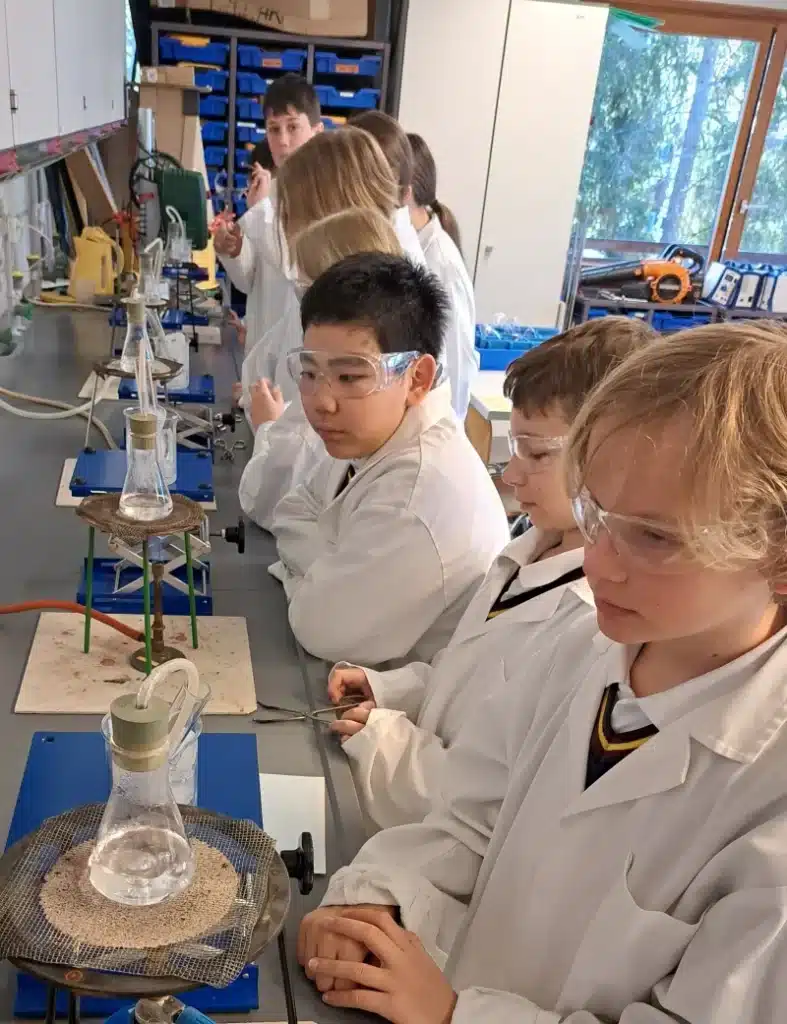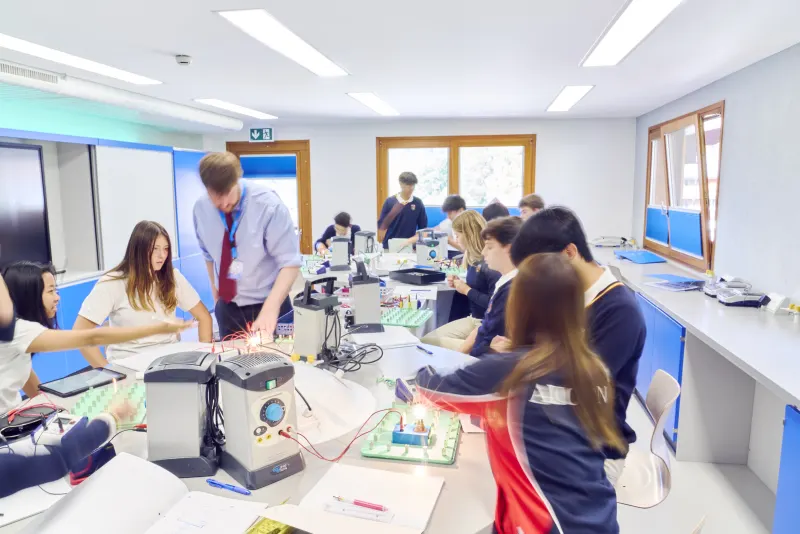For many children, science and maths are associated with rote learning and a sense of confusion. These subjects, fundamental to understanding the world around us, often develop a reputation for being dry and difficult. In the UK, for example, surveys have found that half of children find the subjects too difficult and too boring.
It’s a myth that the teachers at Aiglon are working to dispel. “Our goal is not just to put in place the mathematical fundamentals,” explains Peter Bromfield, Head of Maths at Aiglon College. “It’s to get rid of the misconceptions some children have, where they think they’re not good at maths or science, and to help them feel confident and happy in their classes.”
Hands-on learning
Achieving that starts by making the subject as hands on as possible – quite literally, in some cases. “We have one project called Giant’s Hands, where we give students a large photocopy of my hand and task them with creating a real-size model of how big that person would be,” Mr Bromfield says. The project might be fun, but it also calls on students to draw on many of the things they have been learning. “They’re using mathematical concepts like ratios and proportionality, and statistical skills like data collection, interpretation and presentation.”
The projects also allow students to explore the subject creatively and be guided by their own interests. “One recent project was all about spotting patterns and sequences,” recalls Rona Watson, Deputy Head of Mathematics at Aiglon College. “One student went away and tackled the problem using ‘if’ statements in a spreadsheet. That wasn’t something we had been learning, but he’s so interested in it, the project has allowed him to stretch himself.”
This practical, hands-on approach is also fundamental to a good science education — and something that is a core part of every Aiglonian’s scientific journey towards becoming engaged young scientists who perform to a high level in their exams. “If you had to sit in a classroom and hear me teach about thermodynamics for six months, you’d likely be bored,” says Andy Bowes Lyon, Head of Science at Aiglon. “So instead, the real emphasis is on experiential learning.” That means almost every science lesson has a practical element to it. “Our unique setting allows us to do astronomy at a high altitude in the alps; carry out biology and ESS work surrounded by mountains, alpine pastures and unspoilt nature; and undertake innovative projects like our satellite one.”
The CubeSat project is a new student initative funded thanks to philanthropy from the Aiglon community that will enable Aiglon students to launch their own satellite into orbit. It’s a fascinating and unique project that exemplifies the school’s experiential approach.
The result of this experiential approach to learning is students who develop an intrinsic love of the subject, something that really shines through in the personal science projects. “In addition to routine practical activities, all Year 12 students have a week put aside to conduct their own, individual science coursework,” says Mr Bowes Lyon. “From the vast number of investigations we are supporting, the breadth sees those that range from the effect of sound on plant growth; to an analysis of microplastics found in snow, to lift characteristics of different aerofoil sections, and many, many more. These projects have required bespoke rigs, state-of-the-art chemical analysis technology, wind tunnels and a thousand other provisions to enable students to pursue their passions. Some projects make a real-life change from the outset — for example a Bhutanese student at Aiglon has investigated the flexural strength of composite mud bricks. The lessons from this will influence the choice of building materials in remote villages in Bhutan.”
In recent years, student projects have been of such a high calibre that they’ve been entered into international competitions. “Every year students compete in STEM competitions such as the science olympiads. We have had some notable successes, with students selected to represent Switzerland at the international finals,” Mr Bowes Lyon says.
A community of support
No matter how “out there” some of the projects might seem, the set-up at Aiglon means students have the support needed to pursue them. “We’ve got good student-teacher ratios, so when you’ve got someone who is wanting to try something hyper-ambitious, we can really support that,” Mr Bowes Lyon explains.
Both the maths and science departments have also been able to draw on help from the broader Aiglon network when it comes to supporting students and ensuring they thrive in these subjects. “We had one student last year who was doing an entanglement project that required him to construct a specialist laser,” recalls Mr Bowes Lyon. “At the start of the project, he had the chance to speak with Professor Sir Tejinder Virdee, an alumni parent and former member of the Board of Directors and a leading figure at CERN. Professor Virdee then connected the student with his network within which were academics who were able to advise on how to make the TEA laser he would need as part of his project.”
Closer to home, the maths department has been facilitating similar connections between younger and more senior students. “We’ve got 10 students going into Year 13 who have signed up to provide maths mentoring to Year 11 students who are looking to take Additional Maths IGCSE,” Mr Bromfield says. As a result, older students will be able to develop their mentoring skills — something that’s deeply ingrained in Aiglon’s culture — and younger students will have the chance to push themselves. “It will allow them to really stretch themselves beyond the syllabus,” Mr Bromfield points out.

Creating ‘Eureka!’ moments
As well as providing practical support, these sorts of connections are also helping dispel another long-standing myth about science and maths: that they have no real-world use outside of formal education. “It is something you sometimes hear,” says Mr Bromfield. “Students might say, when will we ever need this in real life, sir?”
Of course, the teachers themselves see — and articulate to students — the value of the subjects, even for those who won’t continue studying them after they leave Aiglon. “In physics we do a lot of modelling. And that mathematical modelling that we use has application to business, economics, social sciences and many others,” explains Mr Bowes Lyon.
But those connections with the wider Aiglon community have helped students see this in practice. “We’ve had webinars with Aiglon alumni who have become successful entrepreneurs off the back of their chemistry training, for example, Mr Bowes Lyon says. “You see students have this sort of ‘Eureka!’ moment, where they suddenly understand ‘this is where science can take me.’”
The environment in which students learn is also helping to create these moments of inspiration. The maths department, for example, has recently undergone a renovation that has created a far more collegiate space that encourages participation. “We’ve got one room that’s got a big Harkness table in it, another that’s shaped like a donut, and there are whiteboards everywhere,” explains Dr Watson. “It’s really changed how students participate. Someone who might have been hesitant to write something down for fear of getting it wrong doesn’t have those same reservations now, because they know they can wipe it straight out and start again.”
Mr Bromfield has experienced something similar in this new teaching environment. “Gone are the days where you had a teacher standing at the front writing questions on a blackboard,” he says. “With the set-up now, students are all able to see one another and are ready to communicate; that makes them feel like they have a voice and creates a collaborative environment.”
During summer 2024, Aiglon will refurbish one physics and two biology science labs. The school has a total of eight science labs. The first development phase saw the chemistry labs totally refurbished in 2023. The second phase will update the physics and biology labs. By autumn 2024 we will have seven fully modernised teaching labs, with a vision to grow this provision further over the coming years.
Hard work pays off
This hands-on, experiential approach to teaching maths and science is worlds away from the rote learning many of us might associate with the subjects. But it’s directly in line with Aiglon’s broader educational philosophy, and it is bearing fruit.
Take the example of higher maths. While the subject was historically something many students felt was “too hard,” today, more and more are choosing to study it. “We’re seeing an increasing number of students studying Higher Level maths,” reports Mr Bromfield. “Last year we had one class, this year we’ve got two classes, and next year we’re hopefully going to have three classes of students studying it.” It’s a pattern that is also playing out in the science department, which has been preparing students well for STEM courses in some of the most acclaimed universities in the world.
The stigma has been a tough one to break, but the message the teachers are sending to students is clear: if you’re willing to put in the work, you will get the support you need to succeed. “We remind students that every higher level subject is difficult,” Mr Bromfield says. “But if you work hard, you’ll do well — and you’ll enjoy it.”










